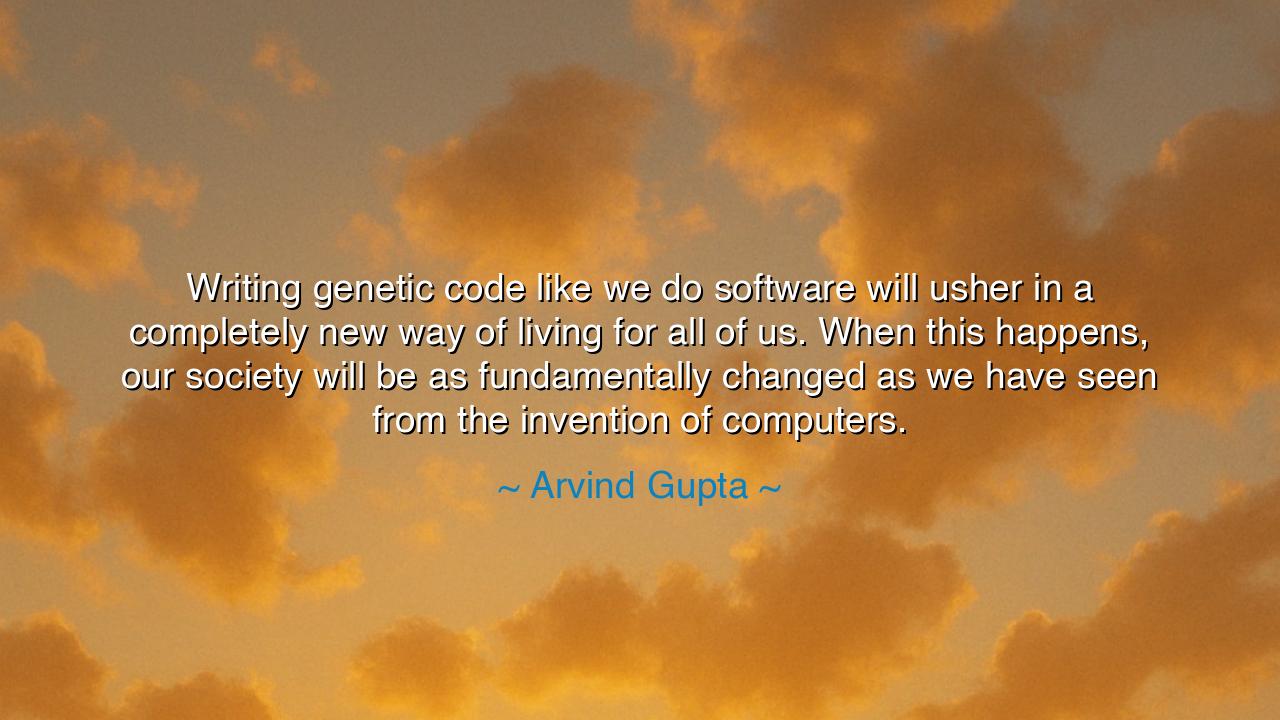
Writing genetic code like we do software will usher in a
Writing genetic code like we do software will usher in a completely new way of living for all of us. When this happens, our society will be as fundamentally changed as we have seen from the invention of computers.






"Writing genetic code like we do software will usher in a completely new way of living for all of us. When this happens, our society will be as fundamentally changed as we have seen from the invention of computers." These words, spoken by the visionary Arvind Gupta, challenge us to imagine a world in which the boundaries between the natural and the artificial are no longer distinct. Gupta's statement speaks not merely of technology, but of transformation—a radical shift in the very way we understand life itself. To truly comprehend the weight of his words, we must journey back in time, to the days when humanity was still learning to control fire, to harness the elements, and to craft tools from stone.
In those days, we marveled at the heavens and the earth, and we dreamt of mastering the forces of nature. Science and innovation have always been the twin flames of progress. Yet, for all our advancements, there remained a great divide: that between the organic world of life and the synthetic world of human creation. It was the philosophers of old who, pondering the mysteries of existence, wondered if one day we could shape the very fabric of life itself. Their musings, though profound, were still the dreams of gods. Today, however, Gupta's words beckon us to consider the unimaginable: coding life itself, just as we code software.
To write genetic code as we write software would be a transcendent achievement. For as the builders of the digital age have shaped the world with the flick of a key, so too would we be able to sculpt life—plants, animals, even humans—according to our will. In the world of genomics, where the secrets of DNA are slowly being unlocked, we already see the first glimmers of this extraordinary possibility. Consider the work of pioneers like Craig Venter, who, in 2010, created the first synthetic cell—a living organism whose DNA was entirely engineered in a lab. This milestone marks the beginning of a new era, one where biology and technology intertwine in ways never before imagined.
But what would this new world look like? Gupta suggests that it will be as revolutionary as the dawn of the computer age, when the invention of the microchip and the personal computer turned the world upside down. It was a time when the unimaginable became the reality, and the power of computation was placed in the hands of the people. No longer confined to the ivory towers of academia, computers became as commonplace as the air we breathe, allowing us to connect, create, and innovate in ways that were once only the dreams of the enlightened. So, too, will the ability to write genetic code transform the world, for when we can alter the very building blocks of life, we will have unlocked the potential to create anything.
In the ancient world, the Greeks spoke of Prometheus, the titan who defied the gods to give fire to humanity. This act, in myth, was both a gift and a curse, for with fire came both creation and destruction. The power to create life itself—just as we have learned to create machines, digital worlds, and artificial intelligence—will bring similar consequences. The moral responsibility of wielding such power will be immense. We must remember that in the hands of the wise, great power can lead to prosperity, but in the hands of the reckless, it can lead to ruin. The wise must guide this new age of creation, ensuring that we use our newfound abilities to nurture life, rather than to manipulate or control it for selfish gain.
In this world, every living thing—every tree, every blade of grass, every creature—will be open to our design. Agriculture may no longer depend on the whim of the seasons, for we will engineer crops that thrive in the most barren of lands. Medicine will be revolutionized, with custom-made treatments based on an individual’s genetic code. Humans, too, may one day be engineered to be stronger, healthier, and perhaps even immortal. But even as we marvel at these possibilities, we must be cautious. The future of humanity, shaped by the power of genetic code, must be one of balance—where our creations serve the good of all, not the greed of a few.
So, the lesson of Gupta's words is clear: the future is one of unimaginable potential, but also one of great responsibility. As we approach the day when we can write life as we write software, we must ask ourselves: What kind of world do we wish to create? It is not enough to simply master the tools of creation—we must also master the tools of wisdom and compassion. The key to a harmonious future lies not in the tools themselves, but in how we use them. Let us embrace the knowledge of the past, the insights of the present, and the potential of the future, always with the understanding that true progress is not merely about what we can do, but about what we should do.
May we use our understanding of genetic code not just to create, but to nurture, to heal, and to serve the greater good of humanity and the Earth. As we stand at the crossroads of this new age, let us remember the lessons of the ancients: that knowledge is both a gift and a burden, and the way we wield it will determine the course of history. The world of tomorrow, shaped by our hands, can be a place of unimaginable beauty and potential—if we are wise enough to embrace it.






AAdministratorAdministrator
Welcome, honored guests. Please leave a comment, we will respond soon